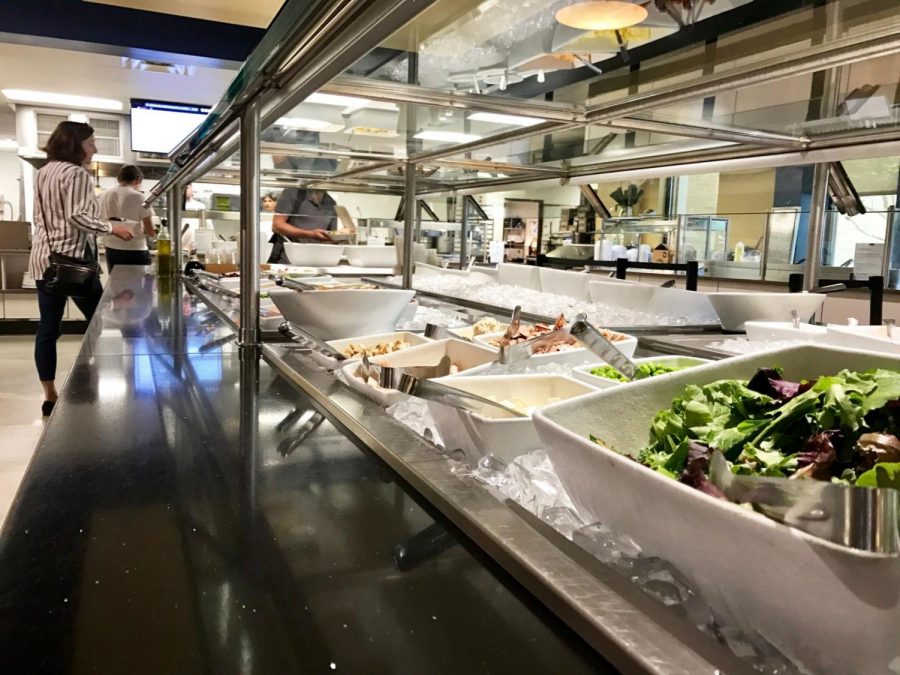Emergency Aid Program provides meal plan dollars to students facing food insecurity
With a higher number of requests for meal plan dollars than anticipated, the students who helped establish a fund to ease food insecurity on campus are calling for the community to contribute more donations.
The fund was launched earlier this month by Monarchs on the Hilltop — a campus organization that advocates on behalf of undocumented students — following an announcement addressing food insecurity from Vice President for Student Affairs Lisa Kirkpatrick. The program allows students to request up to $50 a week in meal plan dollars for the remainder of the semester.
Kirkpatrick joined Monarchs on the Hilltop and Open the Red Doors to tackle food insecurity on campus, and announced that the university will match donations to the fund not exceeding $10,000. “Food insecurity is a struggle for college students across the country and we want our Hilltoppers to seek support if this is a concern for you,” Kirkpatrick’s April 24 message via email stated.
Monarchs on the Hilltop member Joseph Ramirez said about 150 students made requests for meal plan dollars within the first day, and added that donations to the meal plan fund are “depleting faster than we expected. Which is good, that people are using the initiative and the program, but we need to make sure that we replenish the fund so other students can eat.”
Providing meal plan dollars is the first initiative in a broader Emergency Aid Program that will be piloted in the Fall. The goal of the program is to help students who experience a “moment of crisis,” though Ramirez said they are still trying to define what falls under that category.
Of the 338 people total who completed a 2016 survey conducted by Assistant Professor of Psychology Kelly Green, 28 percent of the undergraduate surveyors reported one or more days of going hungry in the past year.
With the meal plan donations, St. Edward’s joins a number of colleges and universities across the state that have initiated similar programs aiming to curb food insecurity. The Texas Tribune reported other schools have started food pantries, grants and, in the case of the community college system in Houston — a “food scholarship” program.
Trellis, a nonprofit that researches student debt issues, wrote in a report last year that “The U.S. Department of Agriculture (USDA) estimates the minimum dietary needs of an adult can be met on $267 per month provided that all food is prepared at home, an unlikely scenario for young adults.”
Multiple undergraduate respondents on another survey Green conducted last year expressed that they forgo buying food on campus since it is not in their budget.
“If I’m hungry, I have to wait till I get home because I can’t afford on campus food,” a respondent wrote.
Another member of Monarchs on the Hilltop, Jose Garibay, said that they’re afraid about the possibility of denying requests for meal plan dollars because there’s not enough money. Though Garibay and Ramirez said they cannot be sure if all the students making requests for meal plan dollars are actually food insecure, Ramirez said that the program as it is prevents students from being stigmatized.
Undergraduate students desiring meal plan dollars can email [email protected] with their request.
“We have seen this enthusiastic response to this initiative on both sides — both from students requesting meal plan contributions and members of the university community who have stepped up to help,” Kirkpatrick said.
Ways to donate to the program include a peer to peer meal plan dollar transfer, transferring unused meal plan dollars, donating by credit card or donating unused Topper Tender. The university will be reporting contribution details in upcoming months.
A respondent to Green’s survey provided their feedback on services available to students, faculty and staff who are low-income prior to the program being established. “If there are resources, they aren’t very known,” the respondent wrote. “Talking more about these resources would be helpful because going to a private university as a low-income student can make you feel embarrassed to ask for help at times.”







